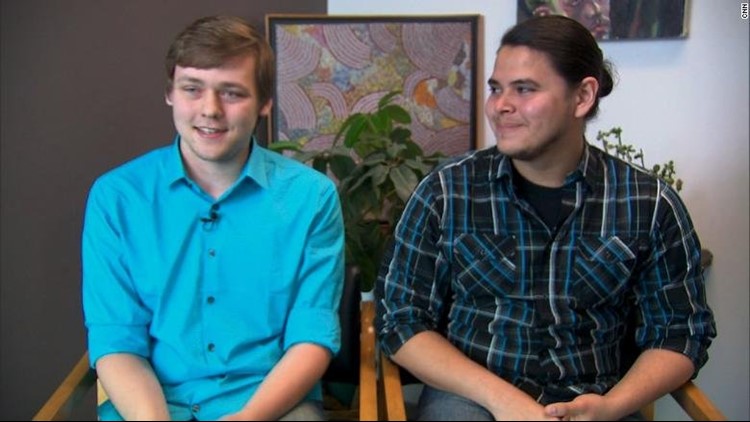In the Washington, DC, area, there are at least a dozen anecdotal examples of DACA recipients, who were brought to the country as children, either recently marrying their US citizen partners or considering marriage sooner than expected.
Freddy Cribas, 24, and Jon Freeman, 23, said they knew within six months of meeting each other in 2009 that they would spend the rest of their lives together.
Cribas, who is from Honduras, said they used to talk about future plans: “We’re going to have this many kids, or this many cats and pets. … And I always thought I would be the one to ask him.”
But Freeman proposed first. In early 2016, Freeman said he saw the “writing on the wall” during the presidential campaign and heard rhetoric from then-candidate Donald Trump regarding immigrants.
Freeman said the prospect of losing the love of his life was “terrifying.”
“You go through life, and then everything’s good. And you realize one person can yank everything you have away from you,” he said.
Additionally, they said that being a gay couple meant that if they moved to Honduras, they would be physically attacked for their sexual orientation. Cribas said members of the LGBT community have been beaten, raped or killed there.
Freeman and Cribas said they would have gotten married anyway, but perhaps would have given themselves more time to plan a big wedding. Instead, they had a small ceremony with only a handful of friends.
Then, they sought out an immigration attorney, Rina Gandhi.
Gandhi also married a DACA recipient, but her husband’s green card process was completed during the Obama administration.
“We could plan out our steps and didn’t need to rely on, you know, having five or six different back-up plans like we did for Freddy and Jon,” Gandhi said.
She said Cribas had a special circumstance in 2017 when he needed to visit his ailing grandfather in Honduras. He was granted what’s called “advanced parole” to go to Honduras and re-enter the United States lawfully.
In September, Trump announced the winding down of the DACA program, with no new applicants allowed. The advanced parole option also disappeared.
Without the advanced parole option, a DACA recipient or other undocumented immigrant married to a US citizen would need to seek a waiver and then return to his or her origin country for an interview to gain a visa to re-enter the United States. The couple must demonstrate that the US spouse would suffer extreme hardship unless the DACA recipient comes back into the United States.
“It’s not easy and it’s not cheap,” Gandhi said.
Even marriage to a US citizen might not guarantee a smooth path for the immigrant spouse to gain citizenship. Marrying a US citizen would not help if someone:
- Committed a crime after receiving DACA status.
- Created fraudulent documents.
- Misrepresented himself or herself as a citizen.
- Left the country and re-entered with no other documentation outside of DACA.
Nearly two years after their small ceremony, Freeman and Cribas are still waiting for Cribas’ green card, a process that can take a long time. They said perhaps they will throw a big party someday to celebrate an anniversary — and the new green card.



